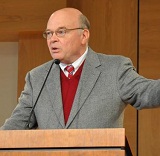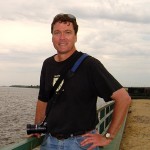Genocide is a complex issue and predicting and preventing it is definitely an ambitious task. Here at the Sentinel Project, we know that we don’t have all the answers and that it’s going to take time and a lot of work to solve this problem. This is why we enthusiastically collaborate with other organizations and experts who share our goals. To help guide our efforts, grow as an organization, and tie us into the larger genocide prevention community, we recently started to assemble an Advisory Council. The members are currently drawn from the fields of genocide studies, which will help with our research and early warning work, and non-profit development, which will give us the direction we need to grow through effective governance, management, and fundraising. Soon we will be adding advisors from the technology development field as well.
It is my pleasure to introduce you to our new advisors.
- Gregory Stanton, PhD – Greg is the president of Genocide Watch and a past president of the International Association of Genocide Scholars. He has a long history of working on human rights and humanitarian causes, including time spent with the Peace Corps and the US Department of State, as well as teaching as a university professor. He has been involved in setting up criminal tribunals for Cambodia, Rwanda, and the former Yugoslavia. Most notably, Greg developed the Eight Stages of Genocide model which was the inspiration for the operational processes used to structure our Threatwiki timelines.

Dr. Gregory Stanton
- Adam Jones, PhD – Adam is a professor of political science at the University of British Columbia as well as the executive director of Gendercide Watch, an NGO dedicated to countering gender-based mass killing. He travels extensively, sometimes in his role as a photojournalist. Adam brings to the team his expertise on genocide-related gender issues and genocide studies in general. Of the several books that he has written, the most recent are the second edition of Genocide: A Comprehensive Introduction and the forthcoming New Directions in Genocide Research

Dr. Adam Jones
- Amanda Grzyb, PhD – Amanda teaches in the Faculty of Information and Media Studies at the University of Western Ontario. Her research interests include commemoration of mass atrocities and media reactions to genocide. She teaches several courses on race, media, and social movements as well as guiding a trip to Poland each year during which students learn about the Holocaust by visiting death camps. Amanda’s most recent publication was The World and Darfur: International Response to Crimes Against Humanity in Western Sudan, which she edited. She will be advising us on media strategy.
- Henry Theriault, PhD – Henry is a professor of philosophy at Worcester State College, where he has taught since 1998 on topics including human rights, genocide denial, long-term justice, and reparations. He is also the co-editor of the journal Genocide Studies and Prevention. He has also served as the coordinator of the Center for the Study of Human Rights based at Worcester and has lectured widely both in the United States and abroad. He will be advising us on both general issues related to genocide as well as genocide education and building relationships with the academic genocide studies community.
- Paddy Bowen – Paddy is a writer, speechwriter, and charity executive who has led a number of Canadian charities including Home Support Canada, the National Respite Care Project, the Voluntary Sector Awareness Project, and Volunteer Canada. As a consultant, she has advised, audited, and helped to develop a broad range of organizations, including work for the Canadian Diabetes Association, Volunteer Australia, the UN Volunteers Program, the Public Policy Forum, Imagine Canada, and the Royal Canadian Mounted Police. Paddy has written extensively about community investment and civic engagement, volunteer methodology, law enforcement, and global safety and security.
- Isabella Smejda – Isabella is a consultant focused on performance support and instructional design for corporate clients, but also includes financial and management consulting and some unusual items, such as the production of two films, Pontypool and Mariachi Gringo. Her early career was in banking and finance, culminating in the position of Vice-President of Central Capital Corporation. Isabella is also a trustee of the Gardiner Museum, where she sits on several committees. She recently completed the Institute of Corporate Directors course “Not-For-Profit Governance Essentials” offered at the Rotman School of Management.
